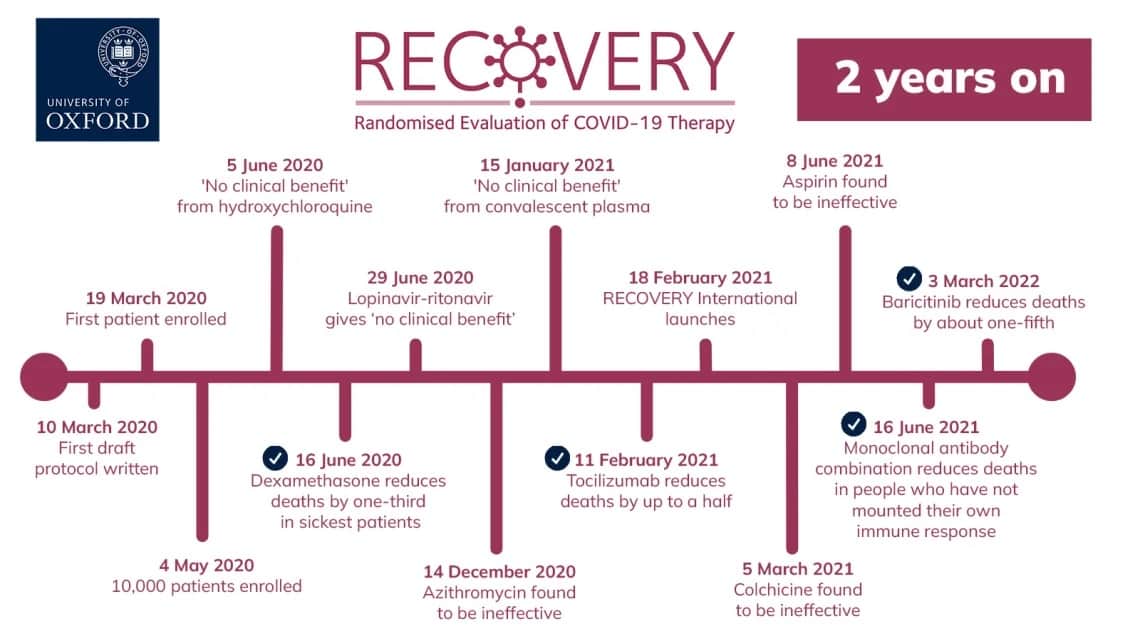The RECOVERY Trial – two years on
Wednesday 23rd Mar 2022, 4.03pm

On the second anniversary of its official launch, the Randomised Evaluation of COVID-19 Therapy (RECOVERY) remains an exceptional study that is leading the global fight against COVID-19. The study is continuing to adapt to the changing dynamics of the pandemic, adding new promising candidate treatments, and launching in new countries with different population and healthcare systems.
It is likely that the true impact of RECOVERY can never be fully measured. But through discovering four treatments that effectively reduce deaths from COVID-19, it is certain that the study has saved thousands – if not millions – of lives worldwide. Crucially, low- and middle-income countries have shared these benefits, particularly since dexamethasone (the first treatment to be discovered) is inexpensive, easily administered and readily available in most hospitals.
The numbers are impressive, but each RECOVERY Trial participant has their own unique story, with many showing immense courage and altruism during one of the most difficult and frightening times of their life. As RECOVERY Trial participant John Hanna, who was put in an induced coma due to severe COVID-19, said: ‘Without the RECOVERY Trial, I don’t think I’d be here today, so I’m very grateful for all the work the team has done since the pandemic struck. I had minimum knowledge of clinical trials before COVID-19, but now I understand the important role these play, and that future studies will be needed to prepare the world for the next pandemic. Since taking part in the trial, I have become a member of the RECOVERY Trial’s Public Advisory Panel, and this gives me a feeling of involvement, belonging and pride to be contributing to something that has been so successful and continues to be.’
But the RECOVERY Trial’s impacts go far beyond saving lives and improving treatment of COVID-19 patients. Through pioneering a simplified, streamlined approach to running clinical trials, RECOVERY has redefined the speed at which life-saving results can be delivered. As Sir Martin Landray, Professor of Medicine and Epidemiology at Oxford Population Health, and Joint Chief Investigator for RECOVERY, said: ‘In 2019, I had no idea that I would be setting up a trial of treatments for an infectious disease, let alone a pandemic virus. I certainly would not have thought it possible to go from a blank piece of paper to enrolling the first patient in nine days, to finding the first life-saving treatment within ten weeks, and for it to be made standard NHS policy within three hours.’
Through integrating into routine care within NHS hospitals, RECOVERY has also shown the power of engaging front-line clinicians in research. Sir Martin Landray added: ‘For many doctors and nurses, their involvement with RECOVERY was their first experience of clinical research, and many have expressed an enthusiasm to continue. This experience could herald a new age for research, not just for this pandemic and the next but for other common infections such as influenza and chronic diseases.’
Health and Social Care Secretary Sajid Javid said: ‘Throughout the pandemic, the government has supported the UK’s world-leading research sector, with millions of pounds of funding for clinical trials into the most promising and innovative medicines. This includes around £2.1 million for the RECOVERY trial which has saved countless lives across the world.
‘I am extremely grateful to the team at the University of Oxford – the brilliant work on RECOVERY has cemented the UK’s position as a global leader in identifying safe and effective treatments for Covid, helping the UK to live with this virus.
‘I look forward to continuing to collaborate to identify more lifesaving treatments.’
For the wider public, the extensive media coverage of the study’s impacts has helped to increase awareness of the importance of clinical trial research, and the need for volunteers to take part in these. Meanwhile, beyond the UK it is hoped that the hospital sites participating in RECOVERY International will benefit from a long-term increased capacity for leading randomised controlled studies.
The RECOVERY Trial team extend their thanks to the many clinical staff who have made this trial possible, the thousands of patients who have taken part, and the funders for the study, particularly the National Institute for Health Research (NIHR), Wellcome, and UK Research and Innovation (UKRI).

